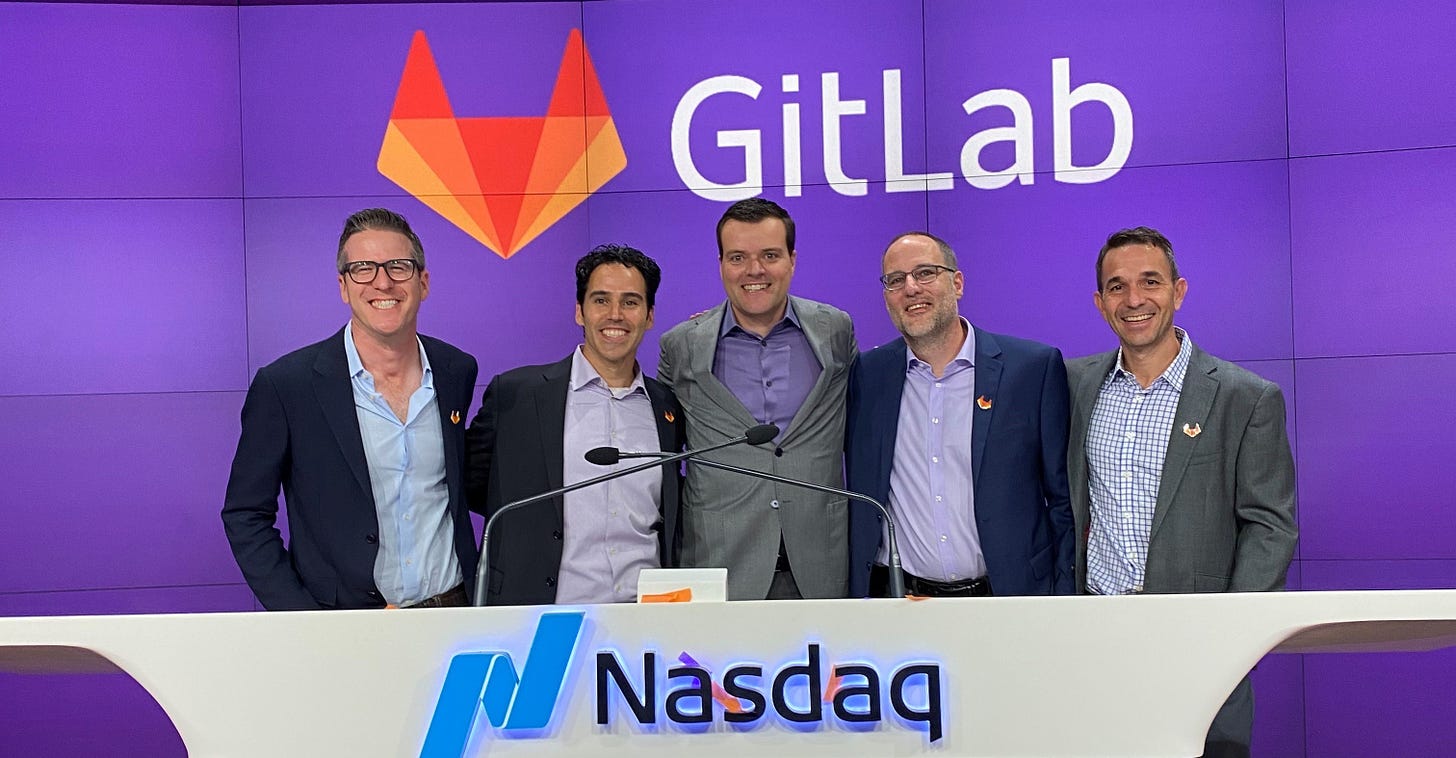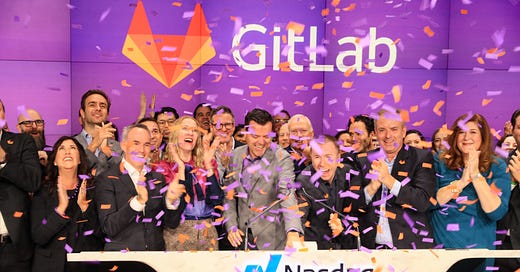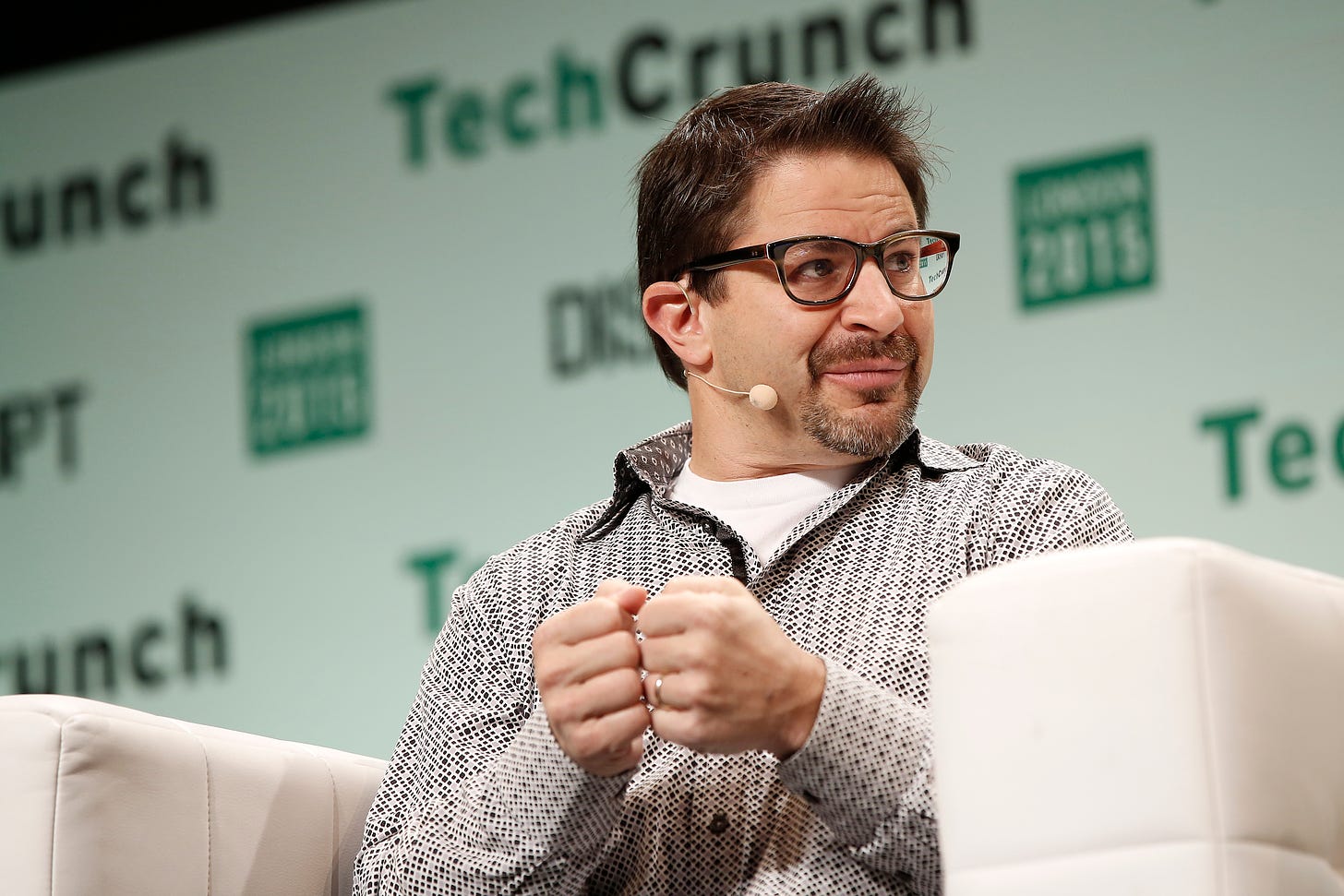The Story of a Cap Table: GitLab
How Khosla Ventures, August Capital, GV, and ICONIQ landed investments in GitLab
From his perch as Y Combinator’s chief operating officer, Qasar Younis alerted investor Ben Ling, Younis’s old boss from their time at Google, whenever he saw a particularly promising startup making its way through YC’s accelerator program.
So that’s how Ling, a prolific early-stage investor who was working as a partner at Khosla Ventures, found himself with back-to-back meetings on March 18, 2015, at Roka Akor in San Francisco.
From 8 p.m. to 8:40 p.m. Ling met with Sytse “Sid” Sijbrandij, the founder of GitLab, a late-to-the-game GitHub competitor with broad ambitions to attack GitHub’s code repository business for enterprise customers. (After that, Ling met with the founder of commuter shuttle company Chariot. He didn’t invest.)
Ling came away from the meeting with Sijbrandij upbeat. He emailed his partners at Khosla, “just met with these guys. Worth meeting. They are deciding whether to raise a seed (1M) or an A and would like to have something wrapped up before demo day.”
Sven Strohband, Khosla’s chief technical officer at the time, replied: “Where are you on them? Positive? If so what funding context?”
Ling replied, “I am positive on them; I haven’t studied github sufficiently to determine their relative merits but they have sufficient customer and revenue traction for us to evaluate seriously.” He concluded, “If you guys like I could easily see us investing $1M to get 10%.”
Strohband ended up leading GitLab’s seed round for Khosla before the company presented at YC Demo Day. “These guys had not only taste. They also had empathy for developers.”
Ashton Kutcher’s Sound Ventures, Liquid 2 Ventures, Ilya Sukhar, 500 Startups, and FundersClub were among the investors in the round, according to Pitchbook. The $1.7 million round valued GitLab at just $13 million.

Coming out of Y Combinator, GitLab caught the attention of August Capital associate Abie Katz, who discovered GitLab on Hacker News. He pushed his firm to lead GitLab’s Series A round. Katz and August partner Tripp Jones brought GitLab in to meet with the partnership.
The company seemed like “the antithesis of everything a smart VC held to be true,” one person close to the deliberations told me. GitLab is based on an open-source project — a strategy that was less understood at the time. GitLab was fully remote back before the pandemic reoriented everyone’s thinking about remote companies. And GitLab was competing with two well-established market leaders in GitHub and Atlassian.
While GitLab had some promising signs — the company already had Apple as a customer and a “three-letter” government agency as one of its users — August passed on the Series A round. Some of the firm’s partners were skeptical of GitLab’s approach.
Over at Khosla, Strohband led the Series A. The firm invested $4 million at a $22.7 million pre-money valuation. “There wasn’t much deliberation. I really wanted to do it,” Strohband says.
He remembers meeting Sijbrandij at Khosla’s offices to negotiate terms and then going to lunch, leaving the lawyers to haggle over the specifics.
Bruce Armstrong, an operating partner at Khosla, took a board seat. He’s helped the company hire some of its key finance executives over the years. Armstrong just stepped off GitLab’s board ahead of the IPO.
Khosla was the largest single GitLab shareholder outside of Sijbrandij, according to GitLab’s IPO filing.
At the time of the IPO, Khosla owned 14.1% of the company. The firm had 19 million shares.
At GitLab’s current stock price, Khosla’s stake is worth about $2 billion. The firm invested $12.75 million in GitLab altogether, including some pro rata in the Series B.
That’s a more than 150X return for Khosla.
Meanwhile, Katz, the August Capital associate, remained excited about GitLab’s promise, though he seemed skeptical a deal would ever come together at August and worried that GitLab could have trouble competing with GitHub. Still, Katz brought up the company regularly inside August Capital.
Then in May 2016, Villi Iltchev joined August as a partner after working as an executive at Box, LifeLock, and Salesforce. Importantly, Iltchev had looked into GitHub as part of Salesforce’s acquisition of Heroku.
Katz and Jones introduced Iltchev to the company and finally the firm had a partner prepared to fight for the deal.
Within 50 days of joining August Capital, Iltchev brought the deal to his partners. “I was like, ‘Guys I think we should do this. This seems really exciting.’”
Sources told me that August Capital’s partnership was decidedly of mixed minds about making an investment. Notably, David Hornik, who had been the first investor in Splunk, had some reservations about the deal, sources told me.
Hornik wrote me in an email, “Everyone had some reservations about the deal. It was anything but a sure thing at that time. I was no more vocal about my reservations than anyone else. We all had concerns about a dominant competitor. We all had questions about the distributed nature of the team,” Hornik wrote. “But we also all saw a big, exciting opportunity to build an end to end dev ops platform. We all discussed appropriate terms for the investment and then collectively worked hard to convince Sid to take our money.”
Iltchev wouldn’t talk about the partnership deliberations, saying only, “not every deal is high fives, but certainly I got support from my partners to do the deal for which I’m grateful.”
August Capital invested $14 million in the Series B and another $1.5 million after that. The firm held an 11.1% stake in GitLab at the time of the IPO. The stake is worth about $1.6 billion.
That’s a more than 100X return for August Capital.
In 2017, GV convinced GitLab to take the firm’s money. GV had looked at GitHub over the years and started chasing GitLab the year prior.
GitLab seems to have been motivated in part by a desire to build a deeper connection with Google, a source told me. (GV’s sole limited partner is Google parent company Alphabet.)
“We felt like the best company in the space would be a standalone third party — it wouldn’t be captive,” says GV’s Dave Munichiello, who led GitLab’s Series C.
GV’s investment in GitLab came after rival GitHub’s cultural problems entered the public eye. I reported in December 2016: “GitHub is Building a Coder’s Paradise. It’s Not Coming Cheap.” I revealed that GitHub had lost $66 million in nine months and that a younger rival, GitLab, was making inroads against incumbent GitHub.
GitLab was positioning itself as everything GitHub was not:
“The big differentiator for GitLab is that it was designed for the enterprise, and GitHub was not,” Sijbrandij told me at the time. “One of the values is frugality, and this is something very close to our heart. We want to treat our team members really well, but we don’t want to waste any money where it’s not needed. So we don’t have a big fancy office because we can be effective without it.”
Munichiello wrote me in an email explaining the investment: “[W]e had been deeply looking at the sector for years and there were many factors that led to our selection of GitLab over GitHub as the platform we wanted to deeply invest our time and resources into. Those factors included authentic alignment of the product offering, team culture, and the developer community.”
After the GV round, GitLab seemed poised for success. “GitLab is a story of ever-increasing interest with every round,” Strohband told me. “It seemed less and less crazy.”
GV invested $20 million at $180 million in GitLab. GV owned 6.6% of GitLab at the IPO. The firm’s shares are worth more than $900 million. That’s a more than 47X return.
On a Thursday in 2018, Sijbrandij called Matthew Jacobson at ICONIQ to let Jacobson know that GitLab was suddenly preparing to raise a funding round. That Saturday Jacobson had a handshake agreement with Sijbrandij.1
“In typical transparent GitLab fashion, Sid immediately posted a photo of us shaking hands to a public GitLab Slack channel,” Jacobson wrote, reflecting on the investment.
ICONIQ led a $100 million investment in GitLab at a $1 billion valuation, a lofty price at the time. Then ICONIQ turned around and co-led another investment in GitLab the following year that valued GitLab at $2.5 billion.
ICONIQ invested roughly $200 million in GitLab as a private company.
The firm owned 11.5% of GitLab at the time of the IPO, according to GitLab’s amended S-1. ICONIQ’s private investments in GitLab are worth about $1.8 billion.
That’s a roughly 9X return.
ICONIQ bought another $50 million worth of GitLab’s shares in the IPO.
While GitLab was growing, August Capital started to unravel.
In December 2018, Hornik and partner Eric Carlborg took some of August Capital’s partnership by surprise and said that they were going to return money to investors and stop raising their newest fund, as Dan Primack has previously reported.2
The firm would stop making new investments as it struggled to win over limited partners. Jones, Iltchev, Katz, and principal Lisa Marone were blindsided by the decision to stop investing.
Iltchev left in 2019 after new investments were halted.
Then, Hornik and Carlborg started a new firm, Lobby Capital, that controlled August Capital’s funds, sources told me. Jones stayed at August Capital until this year, vesting his stake in the fund that included GitLab, according to sources. Meanwhile, Iltchev may have had some of his vesting accelerated, a source told me. Katz, meanwhile, was just an associate when the GitLab investment was made so he didn’t stand to make much off that fund anyway.
Iltchev and Jones were left to decide whether to leave so they could make new investments or stay and increase their ownership in a fund that they believed in.
Despite the firm’s unraveling, Fund VII is looking promising. The $450 million fund includes Sendbird, Hipcamp, Housecall Pro, and MaintainX. Given that August Capital’s stake in GitLab is worth about $1.6 billion, that investment alone will more than return the fund several times over.
It will likely be a lucrative payday for the partners who decided that August Capital didn’t have a future.
In 2019, after Iltchev left August Capital, Hornik filled his board seat at GitLab. “The nice thing about August is everything is a team effort,” Hornik said.
While Jones and Iltchev will likely make less than they would have if August hadn’t broken up, they’ve moved on to other jobs in venture. Jones is a partner at Uncork Capital and Iltchev is at Two Sigma Ventures. I hear that Katz was retroactively given some carry on the GitLab investment given his role sourcing the deal.
Microsoft purchased GitHub in 2018 for $7.5 billion. Today, GitLab is worth about $15 billion.
“[S]ometimes the deal business is more mundane than modern folklore would suggest,” Hornik wrote me in an email. “And, in the end, great successes like GitLab have many fathers, while great failures die as orphans.”
The latest episode of Dead Cat:
We’re joined by New York Times tech reporter Erin Griffith. She’s been on the scene in San Jose covering the fraud trial against Elizabeth Holmes—tech’s trial of the century, or at least the decade, or maybe of a generation. We talk about the surprisingly plodding pace of such a high profile trial, what kind of a case the prosecution appears to be building and what will be the broader reckoning for the tech industry. If there will be one at all.
Matthew Jacobson describes investing in the Series D round: “A few months later, we heard from Sid that he was thinking about a Series D. We literally dropped everything and returned to his living room (albeit a different one) to discuss. We came away from the update convinced of Sid’s vision and conveyed our unbridled enthusiasm. The next day, I got a message from Sid inviting me to dinner that evening. Joined by Sid’s partner, Karen, we had an amazing discussion, and I learned about Karen and Sid’s self-taught experiences in coding and Ruby-on-Rails, their journey from their native Netherlands, and their eclectic professional experiences including bug bounties and engineering recreational submarines. As dessert came, Karen excused herself for a moment and by the time she had returned, we had outlined and agreed to an investment and business partnership. In typical transparent GitLab fashion, Sid immediately posted a photo of us shaking hands to a public GitLab Slack channel.”
Hornik described the breakup this way to me in an email:
“We went out to raise August VIII in early 2018. By December of 2018 our LPs had made quite clear that they would rather see more liquidity before investing in a new fund. There was some debate as to the best path forward but the majority of the partners in the firm decided to focus on building the portfolio before going out to raise again. When we chose to focus on our existing funds, Villi and Abie left the firm. Tripp remained a partner at August and continued as a partner until the time that he chose to join Uncork Capital.
After taking Fastly and Bill.com public and delivering meaningful liquidity to our existing LPs, we began discussing raising a new fund. We considered raising the fund as August VIII but decided instead to raise the new fund as Lobby Capital, named after the tech conference the firm had run for the last 15 years. The August partners continued to manage all active August funds (including Tripp until he chose to leave the firm earlier this year). No new investments will be made out of August Capital. All new investments will be made out of Lobby Capital. August Capital has not unraveled. It continues to manage 3 strongly performing funds, including August VII, which looks to be a fantastic fund.”
Hornik continued, “Villi did leave the firm after we decided to postpone raising the new fund. Abie remained with the firm for some time thereafter before leaving of his own volition. And Tripp remained a partner with August Capital until he chose to leave and join Uncork Capital. Tripp could have remained a partner at August Capital for the duration of August VII. He chose not to.”








